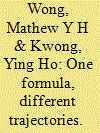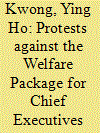| Srl | Item |
| 1 |
ID:
171029


|
|
|
|
|
| Summary/Abstract |
Scholars have long identified the pivotal importance of business-led governance in the Hong Kong and Macau Special Administrative Regions (SAR) of China. Both are governed under a “one country, two systems” arrangement which in theory provides autonomy. However, this identical formula has resulted in very different trajectories, as the coalition in Hong Kong has failed to serve as an effective intermediary between the state and society amidst a series of governing crises, whereas the one in Macau has been largely successful in maintaining political stability. This article argues that a new class of elites in Macau has emerged and competes for political influence by building communal networks and mobilizing social support. In contrast, a relatively static elite structure in Hong Kong has done little to adapt to changing political circumstances.
|
|
|
|
|
|
|
|
|
|
|
|
|
|
|
|
| 2 |
ID:
136295


|
|
|
|
|
| Summary/Abstract |
In recent years, a series of social protests such as the “Sunflower Student Movement”inTaiwan and the “Umbrella Movement”in Hong Kong have sparked concerns over the political atmosphere in the Greater China Region.Compared withTaiwan and Hong Kong,the people of Macao have long been considered politically apathetic,with a low level of political awareness and efficacy. When asked whether they would oppose the government if their interests had been seriously infringed, around 40% of respondents chose to remain silent, perhaps out of a desire for“social harmony,”whereas 92.1% had no experience of engagement in any social movement. (1) It therefore came as a surprise when 20,000 people took to the streets on 25 May 2014 to protest against a bill that would have given generous benefits packages to outgoing Chief Executives (CEs) and top officials. In what was regarded as the biggest march since the 1999 handover, this exceptional scenario reveals the existence of a civic culture among the youth of Macao.
|
|
|
|
|
|
|
|
|
|
|
|
|
|
|
|